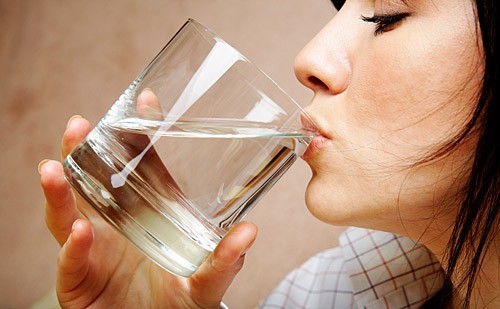Top 11 Benefits of Drinking Water
The human body is anywhere from 55% to 78% water depending on body size. A rule of thumb, 2/3 of body is consists of water, and it is the main component of human body. Did you know that your tissues and organs are mainly made up of water? Here is the %:
|
|
- Muscle consists of 75% water
- Brain consists of 90% of water
- Bone consists of 22% of water
- Blood consists of 83% water
The functions of water in human body are vital. The water:
- Transpsort nutrients and oxygen into cells
- Moisturizes the air in lungs
- Helps with metabolism
- Protect our vital organ
- Helps our organs to absorb nutrients better
- Regulates body temperature
- Detoxifies
- Protect and moisturizes our joints
Every cell in your body needs water from head to toe. That is why it is so important to drink enough fluid. Take for example, brain consists of 90% of water, if you do not supply enough water to your body, your brain cannot function well, and you will get headache or migraine. Hence, next time, if you feel fatigue and headache, it may be the sign of dehydration.
The Harmful Effects Result from Dehydration: (Dehydration means your body does not have as much water and fluids as it should. )
- Tiredness
- Migraine
- Constipation
- Muscle cramps
- Irregular blood-pressure
- Kidney problems
- Dry skin
- 20% dehydrated – Risk of death
Top 11 Health Benefits of Drinking Water
You will be amazed of the benefits of drinking water as follow:

- Lose weight: Drinking water helps you lose weight because it flushes down the by-products of fat breakdown. Drinking water reduces hunger, it’s an effective appetite suppressant so you’ll eat less. Plus, water has zero calories.
- Natural Remedy for Headache: Helps to relieve headache and back pains due to dehydration. Although there are many other reasons contribute to headache, dehydration is the common one.
- Look Younger with Healthier Skin: You’ll look younger when your skin is properly hydrated. Water helps to replenish skin tissues, moisturizes skin and increase skin elasticity.
- Better Productivity at Work: Your brain is mostly made up of water, thus drinking water helps you think better, be more alert and more concentrate.
- Better Exercise: Drinking water regulates your body temperature. You’ll feel more energetic when doing exercises and water helps to fuel your muscle.
- Helps in Digestion and Constipation: Drinking water raises your metabolism because it helps in digestion. Fiber and water goes hand in hand so that you can have your daily bowel movement.
- Less Cramps and Sprains: Proper hydration helps keep your joints and muscles lubricated, so you’ll less likely get cramps and sprains.
- Less Likely to Get Sick and Feel Healthy:Drinking plenty of water helps fight against flu and other ailments like kidney stones and heart attack. Water adds with lemon is used for ailments like respiratory disease, intestinal problems, rheumatism and arthritis etc. Another words one of the benefits of drinking water can improve our immune system.
- Relieves Fatigue: Water is used by the body to help flush out toxins and waste products from the body. If your body lacks of water, your heart, for instance, need to work harder to pump out the oxygenated blood to all cells, so are the rest of the vital organs, your organs will be exhausted and so are you.
- Good Mood: Your body feels very good and that’s why you feel happy.
- Reduce the Risk of Cancer: Related to the digestive system, some studies show that drinking a healthy amount of water may reduce the risks of bladder cancer and colon cancer. Water dilutes the concentration of cancer-causing agents in the urine and shortens the time in which they are in contact with bladder lining.
How much water do you need?

Every day you lose water through your breath, perspiration, urine and bowel movements. For your body to function properly, you must replenish its water supply by consuming beverages and foods that contain water.
So how much water does the average, healthy adult living in a temperate climate need? In general, doctors recommend 8 or 9 cups. Here are the most common ways of calculating that amount:
- Replacement approach. The average urine output for adults is about 1.5 liters (6.3 cups) a day. You lose close to an additional liter (about 4 cups) of water a day through breathing, sweating and bowel movements. Food usually accounts for 20 percent of your total fluid intake, so if you consume 2 liters of water or other beverages a day (a little more than 8 cups) along with your normal diet, you will typically replace your lost fluids.
- Eight 8-ounce glasses of water a day. Another approach to water intake is the "8 x 8 rule" — drink eight 8-ounce glasses of water a day (about 1.9 liters). The rule could also be stated, "Drink eight 8-ounce glasses of fluid a day," as all fluids count toward the daily total. Although the approach really isn't supported by scientific evidence, many people use this easy-to-remember rule as a guideline for how much water and other fluids to drink.
- Dietary recommendations. The Institute of Medicine advises that men consume roughly 3 liters (about 13 cups) of total beverages a day and women consume 2.2 liters (about 9 cups) of total beverages a day.
Even apart from the above approaches, if you drink enough fluid so that you rarely feel thirsty and produce 1.5 liters (6.3 cups) or more of colorless or slightly yellow urine a day, your fluid intake is probably adequate. If you're concerned about your fluid intake, check with your doctor or a registered dietitian. He or she can help you determine the amount of water that's best for you.





 CAclubindia
CAclubindia
